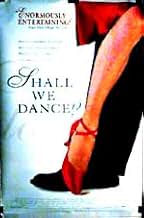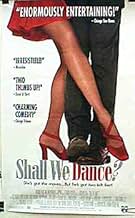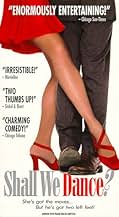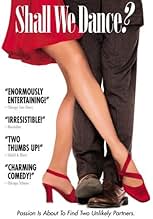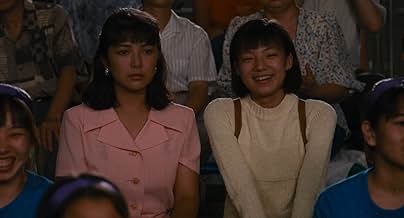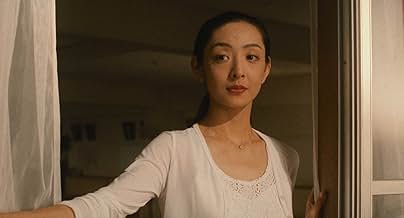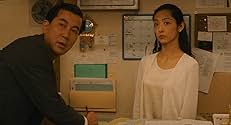IMDb-BEWERTUNG
7,7/10
12.169
IHRE BEWERTUNG
Füge eine Handlung in deiner Sprache hinzuA successful but unhappy Japanese accountant finds the missing passion in his life when he begins to secretly take ballroom dance lessons.A successful but unhappy Japanese accountant finds the missing passion in his life when he begins to secretly take ballroom dance lessons.A successful but unhappy Japanese accountant finds the missing passion in his life when he begins to secretly take ballroom dance lessons.
- Auszeichnungen
- 55 Gewinne & 7 Nominierungen insgesamt
Eri Watanabe
- Toyoko Takahashi
- (as Eriko Watanabe)
Reiko Kusamura
- Tamako Tamura
- (as Raiko Kusamura)
Empfohlene Bewertungen
This movie opened in Korea four years later than in Japan due to the now-defunct ban on Japanese pop culture in Korea. But the audiences in Korea were just as enthralled and enchanted by the story as the rest of the world was.
Like Japan, there are many salarymen in Korea who are also facing a mid-life crisis. After the movie premiered in Seoul, dance studios were reporting up to a 50-percent increase in the number of new students.
I took two years of jazz dance during college, and have seen Strictly Ballroom and Dance With Me. But this movie was the driving force behind me finally signing up for ballroom dance (called dancesport in Korea) lessons.
Mr. Aoki was hilarious as the employee who led a double life unbeknownst to his colleagues. It was also interesting to find out the reasons why the other students took lessons.
I too would have taken classes just to get close to the sexy dance instructor alone.
This movie is a perfect ten in my book.
Like Japan, there are many salarymen in Korea who are also facing a mid-life crisis. After the movie premiered in Seoul, dance studios were reporting up to a 50-percent increase in the number of new students.
I took two years of jazz dance during college, and have seen Strictly Ballroom and Dance With Me. But this movie was the driving force behind me finally signing up for ballroom dance (called dancesport in Korea) lessons.
Mr. Aoki was hilarious as the employee who led a double life unbeknownst to his colleagues. It was also interesting to find out the reasons why the other students took lessons.
I too would have taken classes just to get close to the sexy dance instructor alone.
This movie is a perfect ten in my book.
Subtitles should not deter you from this charmer of a film. Ballroom Dancing, which is seen as risque in Japan, becomes the unlikely passion of an accountant who has gotten everything he thought he wanted and found he missed out on happiness. He begins classes hoping to meet a girl he saw looking as sad as he was himself, but finds that dance has charms of its own. Like Babette's Feast, the insight into another culture, and the elegant structure of the film leave you more than satisfied.
10joshL1
I don't like "grade inflation" but I just had to give this a 10. I can't think of anything I didn't like about it. I saw it last night and woke up today thinking about it. I'm sure that the Hollywood remake that someone told me about, with J Lo and Richard Gear, will be excellent, but this original Japanese version from 1996 was so emotional and thought-provoking for me that I am hard-pressed to think of any way that it could be improved, or its setting changed to a different culture.
A story I found worth watching, and with o fist-fight scenes or guns going off or anything of the sort! Imagine that!
All the characters seemed well-developed, ... even non-primary characters had good character-development and enjoyable acting, and the casting seemed very appropriate.
It's always hard to find a good movie-musical in our day and age, and perhaps this doesn't quite qualify (there is plenty of learning how to dance, but no singing) but I really think that Gene Kelly and others who championed a place for dance in our lives would have thought so very highly of this film and the role of dance in helping to tell a story about a middle aged man, successful with a family in Japan, looking for something... he knows not precisely what.
To the team of people in Japan who contributed to this film, thank you for creating and doing it.
A story I found worth watching, and with o fist-fight scenes or guns going off or anything of the sort! Imagine that!
All the characters seemed well-developed, ... even non-primary characters had good character-development and enjoyable acting, and the casting seemed very appropriate.
It's always hard to find a good movie-musical in our day and age, and perhaps this doesn't quite qualify (there is plenty of learning how to dance, but no singing) but I really think that Gene Kelly and others who championed a place for dance in our lives would have thought so very highly of this film and the role of dance in helping to tell a story about a middle aged man, successful with a family in Japan, looking for something... he knows not precisely what.
To the team of people in Japan who contributed to this film, thank you for creating and doing it.
Shohei Sugiyama is a dispirited salaryman who has lost his lust for life. Despite having a wife and daughter, a nice house and a steady job, depression grips him. One day, while riding the train home, he spots a beautiful, forlorn looking woman-Mai Kishikawa- gazing out the window of a dance studio. Although not really interested in dance, Sugiyama plucks up enough courage to take lessons in the studio, in order to get to know her. Under the tuition of the elderly Tamako Tamura, however, he begins to fall in love with dancing, finding meaning in his life once more.
Written and directed by Masayuki Suô, 'Shall We Dance?' is a heartwarming comic-drama that works on multiple levels. Funny and sad both, it can be viewed as a critique of rigid, conformist Japanese society, which is contrasted with the expressive, liberating Western dance practiced in the studio. It also shows how one's life can become better and more meaningful by following a dream or goal, and how purpose can be restored by doing so. Conversely, it also illustrates how communication and honesty are vital for relationships to prosper, shown through the clashes and confusions between Sugiyama and his wife Masako, as well as those between Mai and her old dance partner.
Above all else, it is a love letter to ballroom dancing, and those that practice it. Sugiyama's stale existence is given colour and excitement after he joins the studio. Not only does he have something to live for, but he begins meeting people who genuinely affect him. Whether it is his mentor Tamura, or his friend Tomio Aoki, everyone he meets while dancing brings something to his life, not least of which is Mai, who- perhaps inadvertently- teaches him to love again. Suô's screenplay is full of depth, as well as great, witty dialogue, and is compelling and captivating.
Naoki Kayano's cinematography is stylish and evocative, contributing to the mood of the piece. He captures the dance sequences with verve, heightening the emotion with his tracking shots and snappy zooms. He contrasts the dull, dour tones of Sugiyama's office and home with the bright, colourful hues of the dance studio and the ballroom competitions, reflecting the different worlds that Sugiyama inhabits. Lush and memorable, Kayano's work complements the graceful and energetic movements of the dancers, creating a remarkable visual spectacle.
Moreover, the expertly choreographed dancing is incredible to behold. The film makes ballroom dancing- when learnt properly- look like the most beautiful expression of emotion on earth. The soundtrack is stirring, making excellent use of songs by the likes of Rogers and Hammerstein, while Yoshikazu Suo's original score complements the narrative astutely. Furthermore, Kyôko Heya's production design- in conjunction with Kayano's visuals- is full of contrast and realism, bolstering the film's impact.
Koji Yakusho stars as Sugiyama, opposite Tamiyo Kusakari as Mai, Reiko Kusamura as Tamura and Naoto Takenaka as Aoi. Yakusho, as always, makes the character compelling and complex, bringing much humour to the role. We empathise with Sugiyama, and are on his side the whole way through. Kusakiri, a professional dancer in her first acting role, is excellent, displaying Mai's reserve and inner feelings marvellously. Kusamura nearly steals the show as the kind-hearted Tamura, while Takenaka is a source of constant delight as the Salsa-dance loving Aoi. In addition, Hideko Hara does strong work as Sugiyama's wife Masako, sharing a great chemistry with Yakusho.
In conclusion, Masayuki Suô's 'Shall We Dance?' is a delightful, funny film both poignant and powerful. With a strong screenplay full of humorous dialogue and scenes, striking cinematography and production design and a memorable score, it works on many levels. Boasting terrific performances from all in the cast- especially those of Koji Yakusho, Tamiyo Kusakiri and Reiko Kusamura- and featuring much expertly choreographed ballroom dancing, if the question is 'Shall We Dance?', the answer must surely be yes.
Written and directed by Masayuki Suô, 'Shall We Dance?' is a heartwarming comic-drama that works on multiple levels. Funny and sad both, it can be viewed as a critique of rigid, conformist Japanese society, which is contrasted with the expressive, liberating Western dance practiced in the studio. It also shows how one's life can become better and more meaningful by following a dream or goal, and how purpose can be restored by doing so. Conversely, it also illustrates how communication and honesty are vital for relationships to prosper, shown through the clashes and confusions between Sugiyama and his wife Masako, as well as those between Mai and her old dance partner.
Above all else, it is a love letter to ballroom dancing, and those that practice it. Sugiyama's stale existence is given colour and excitement after he joins the studio. Not only does he have something to live for, but he begins meeting people who genuinely affect him. Whether it is his mentor Tamura, or his friend Tomio Aoki, everyone he meets while dancing brings something to his life, not least of which is Mai, who- perhaps inadvertently- teaches him to love again. Suô's screenplay is full of depth, as well as great, witty dialogue, and is compelling and captivating.
Naoki Kayano's cinematography is stylish and evocative, contributing to the mood of the piece. He captures the dance sequences with verve, heightening the emotion with his tracking shots and snappy zooms. He contrasts the dull, dour tones of Sugiyama's office and home with the bright, colourful hues of the dance studio and the ballroom competitions, reflecting the different worlds that Sugiyama inhabits. Lush and memorable, Kayano's work complements the graceful and energetic movements of the dancers, creating a remarkable visual spectacle.
Moreover, the expertly choreographed dancing is incredible to behold. The film makes ballroom dancing- when learnt properly- look like the most beautiful expression of emotion on earth. The soundtrack is stirring, making excellent use of songs by the likes of Rogers and Hammerstein, while Yoshikazu Suo's original score complements the narrative astutely. Furthermore, Kyôko Heya's production design- in conjunction with Kayano's visuals- is full of contrast and realism, bolstering the film's impact.
Koji Yakusho stars as Sugiyama, opposite Tamiyo Kusakari as Mai, Reiko Kusamura as Tamura and Naoto Takenaka as Aoi. Yakusho, as always, makes the character compelling and complex, bringing much humour to the role. We empathise with Sugiyama, and are on his side the whole way through. Kusakiri, a professional dancer in her first acting role, is excellent, displaying Mai's reserve and inner feelings marvellously. Kusamura nearly steals the show as the kind-hearted Tamura, while Takenaka is a source of constant delight as the Salsa-dance loving Aoi. In addition, Hideko Hara does strong work as Sugiyama's wife Masako, sharing a great chemistry with Yakusho.
In conclusion, Masayuki Suô's 'Shall We Dance?' is a delightful, funny film both poignant and powerful. With a strong screenplay full of humorous dialogue and scenes, striking cinematography and production design and a memorable score, it works on many levels. Boasting terrific performances from all in the cast- especially those of Koji Yakusho, Tamiyo Kusakiri and Reiko Kusamura- and featuring much expertly choreographed ballroom dancing, if the question is 'Shall We Dance?', the answer must surely be yes.
10ven2s
This movie is among my favorite foreign films, some of the others are Amilee and My Life As a Dog. The similarities with those movies as with so many great foreign films, is that it takes a mundane slice of life and transforms it into a profound heartfelt lesson.
In Japan, a man who is bored with his mundane life and the rut of his married life, sees a beautiful Japanese woman staring out the window of a dance studio. In the instant that it takes his train to pass, he is enthralled by her. But is it only by her beauty, by her faraway glance, or a connection that they will both discover that they share?
Shall We Dance has memorable wonderful characters who have to deal with painful realities by transcending them through the world of dance. Breaking traditional moulds and stereo types of Japanese society, they risk all for happiness and find that joy is not too far away. It is one of those movies that is so magical and meaningful and, in itself, transcends the mundane by showing the true magic and miracle that life can be.
In Japan, a man who is bored with his mundane life and the rut of his married life, sees a beautiful Japanese woman staring out the window of a dance studio. In the instant that it takes his train to pass, he is enthralled by her. But is it only by her beauty, by her faraway glance, or a connection that they will both discover that they share?
Shall We Dance has memorable wonderful characters who have to deal with painful realities by transcending them through the world of dance. Breaking traditional moulds and stereo types of Japanese society, they risk all for happiness and find that joy is not too far away. It is one of those movies that is so magical and meaningful and, in itself, transcends the mundane by showing the true magic and miracle that life can be.
Wusstest du schon
- WissenswertesIn the first scene, a man's shoe in close-up plunges into a black pool in the street. This symbolizes the world renowned Ballroom Dancing Competition in Blackpool, England, referenced later in the film.
- Zitate
Shohei Sugiyama: At my age, it's embarrassing to say so, but every day I feel so alive.
- Alternative VersionenOriginal Japanese version (pre-Miramax) runs 136 minutes and is available on Hong Kong laseridisc with English and Chinese subtitles.
Top-Auswahl
Melde dich zum Bewerten an und greife auf die Watchlist für personalisierte Empfehlungen zu.
- How long is Shall We Dance??Powered by Alexa
Details
Box Office
- Bruttoertrag in den USA und Kanada
- 9.619.222 $
- Weltweiter Bruttoertrag
- 9.619.222 $
Zu dieser Seite beitragen
Bearbeitung vorschlagen oder fehlenden Inhalt hinzufügen



